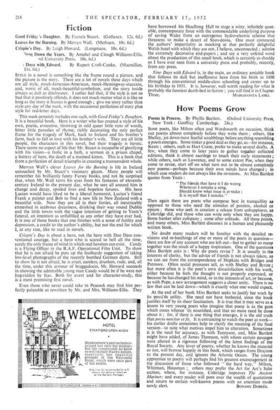Fiction
long Down the Years. By Amabel and Clough Williams-Ellis. col University Press. 10s. 6d.) Days with_Edward. By Rupert Croft-Cooke. (Macmillan.
1 ls. 6d.) STYLE in a novel is something like the frame round a picture, and the picture is the story. There are a lot of novels these days which are all style, mock-Jamesian-American, mock-Hemingway-staccato, and, worst of all, mock-beautiful-symbolism, and the story inside always as dull as ditchwater. I rather feel that, if the style is not so bad that it positively offends, it does not much matter what it is like so long as the story it frames is good enough ; give me story rather than style any day of the week, with the occasional perfection of story plus style for red-letter days.
This week certainly includes one such, with Good Friday's Daughter. It is a beautiful book. Here is a writer who has created a style of his own, poetic, evocative, throwing in odd queer little runs of words, bitter little parodies of rhyme, richly decorating the only perfect frame for the tragedy of Mark, back to Ireland and his brother's farm, back to fall in love with his brother's wife. They are all little people, the characters in this novel, but their tragedy is heroic. There seems no aspect of life that Mr. Stuart is incapable of glorifying with his vision—a frolic in a bath, a sermon in a prison chapel, a battery of hens, the death of a maimed kitten. This is a book that from a perfection of detail triumphs in creating a transcendent whole.
Mervyn Wall's clever Leaves for the Burning is life in Ireland untouched by Mr. Stuart's visionary gleam. Many people will remember his brilliantly funny Fursey books, and not be surprised that, when Mr. Wall turns his eyes from his fantasies of eleventh- century Ireland to the present day, what he sees all around him is change and decay, spoiled lives and hopeless futures. His hero Lucian would have liked to be a liberal humanist, Lucian's friend Frank a painter and Bob to find a new life in New Zealand with a beautiful wife. Now they are all in their forties, all inextricably enmeshed in scabrous dreariness, drinking their way round Dublin and the little towns with the vague intention of getting to Yeats's funeral, an intention as unfulfilled as any other they have ever had. It is one of those books that one finishes with a sense of futility and depression, a credit to the author's ability, but not the end for which I, at any rate, like to read in novels.
Crispin's Day is about a hero, not the hero with Dan Dare con- ventional courage, but a hero who is scared to hell all the time, surely the only frame of mind in which real heroism can exist. Candy is a Flying Officer in the R.A.F. Operational Film Unit. To show that he is not afraid he puts up the foolhardy suggestion of taking low-level photographs of the recently bombed German dams. Still to show he is not afraid, he is cruel, careless, drunken, rude, and, all the time, under this armour of braggadocio, Mr. Howard succeeds in-showing the admirable young man Candy would be if he were not hag-ridden by fear. Both for event and for character-study, this is a most promising first novel.
Even those who never could take to Peacock may find him per- fectly palatable as rewritten by Mr. and Mrs. Williams-Ellis. They have borrowed his Headlong Hall to stage a witty, infinitely quot- able, contemporary farce with the commendable underlying purpose of saving Wales from an outrageous hydro-electric scheme that threatens to make a desert of Snowdonia. One must commend the authors' impartiality in mocking at that perfectly delightful Welsh hotel with which they are not, I believe, unconnected ; admire the extremely decorative end-papers ; and say a very unkind word about the production of this small book, which is certainly as shoddy as I have ever seen from a university press and probably, recently, from any press.
Nine Days with Edward is, in the main, an ordinary amiable book that follows its dull but inoffensive hero from his birth in 1890 through his conventional middle-class schooling and career up to his birthday in 1951. It is, however, well worth reading for what is probably the funniest death-bed in fiction ; you will find it in Chapter


























 Previous page
Previous page